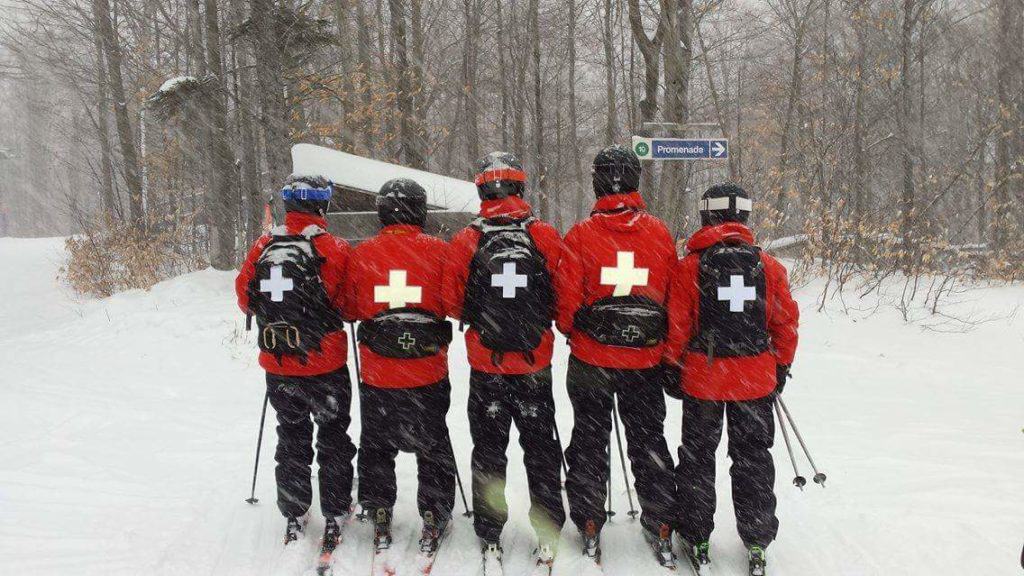
By Emma Cotton and Katie Jickling/VTDigger
Ski patrols count as health care workers.
The state is currently distributing the Covid-19 vaccine to “health care workers likely to be exposed/treat Covid-19 patients” and “long-term care facility residents and staff who have patient contact,” as part of group 1a, according to state guidelines.
But who qualifies under that definition has evolved, sparking questions and controversy.
A policy change last week has allowed police and firefighters to be considered part of this high-priority group, and law enforcement officers have started to receive messages from the state about scheduling vaccinations for sworn officers.
Since Dec. 15, the state has been vaccinating health care workers and Vermonters living and working in elder care facilities. As of Friday, Jan. 8, about 21,000 people received the first dose; the remaining 40,000 health care workers are expected to receive their first shot by the end of January.
Though officials say outbreaks haven’t been traced back to ski areas, cases of Covid-19 have recently increased in some towns with ski areas, and residents of those towns have reported that out-of-state travelers aren’t always adhering to the state’s quarantine guidelines.
Some residents have accused the state of using a limited vaccine supply to keep ski resorts open and economically viable rather than prioritizing public safety.
The National Education Association Vermont Champter issued a statement Friday morning detailing its frustrations, saying: “The state’s largest union is seeking clarity about the state’s vaccination priorities now that members of ski patrols are being vaccinated ahead of in-school educators and other front-line workers.”
The state maintains the choice to include patrols does, in fact, prioritize public safety.
“They still fit the category of being a first responder who’s directly in contact with a human being who is often in a vulnerable situation, and for a long time, because of the nature of the work they do,” said Mark Levine, commissioner of the Vermont Dept. of Health.
Many in charge of distributing vaccines agree that, given the fact that mountains are open, it’s important for patrollers who have extended contact with patients to be protected. Hospital representatives also say many ski patrols also serve with emergency medical services (EMS), and that their top priority rests mainly with vaccinating as many qualified people as possible with the available supply.
Gerianne Smart, spokesperson with Rutland Regional Medical Center (RRMC), said the hospital has been vaccinating ski patrollers from Killington.
“We have vaccinated them because they deal with patients and people who are injured,” she said. “These are people, a lot of times, from out of state, and then they would end up coming to the hospital. So there’s a lot involved.”
Killington Fire and Rescue Chief Gary Roth confirmed that EMS workers in Killington have already been vaccinated, and Rutland City Police Chief Brian Kilcullen said the department is now working with the state to organize vaccinations for officers.
“Just yesterday, we received notice that first responders who have some responsibility in caring for or transporting those who require medical attention are in the mix for the vaccination,” Kilcullen said. “We’re in the process of compiling our roster to send it to the state.”
Kilcullen, a member of the National Ski Patrol, said he understands why patrols fit under the definition of health care workers, and also understands why police officers should get the vaccine because of their contact with the community, including patients.
“Ski patrol are called to respond to assist with the care or transport of injured persons, as are police officers,” he said. “I see the merits for both groups.”
Updated vaccine prioritization
On Tuesday, Jan. 5, the Vaccine Implementation Advisory Committee released its updated guidance on who will be prioritized for a vaccine, adding details to the plan previously outlined by the Dept. of Health. More details will be provided Friday, Jan. 18.
Under the plan, the state will prioritize Vermonters age 75 or older, followed by people age 65-74, and residents age 40-64 with underlying health conditions.
Next in line will be frontline essential workers — the employees in regular contact with the public who are unable to work remotely or to social distance.
In the third group, the state will prioritize people of color, and people with limited English proficiency, as well as other frontline workers, high-risk Vermonters between age 16 and 39 and residents and staff in group homes.
The vaccine advisory group noted that the guidance is not binding and will require flexibility as the number of doses shift and scientific research advances. “This is the largest vaccine effort ever undertaken,” the group wrote.




